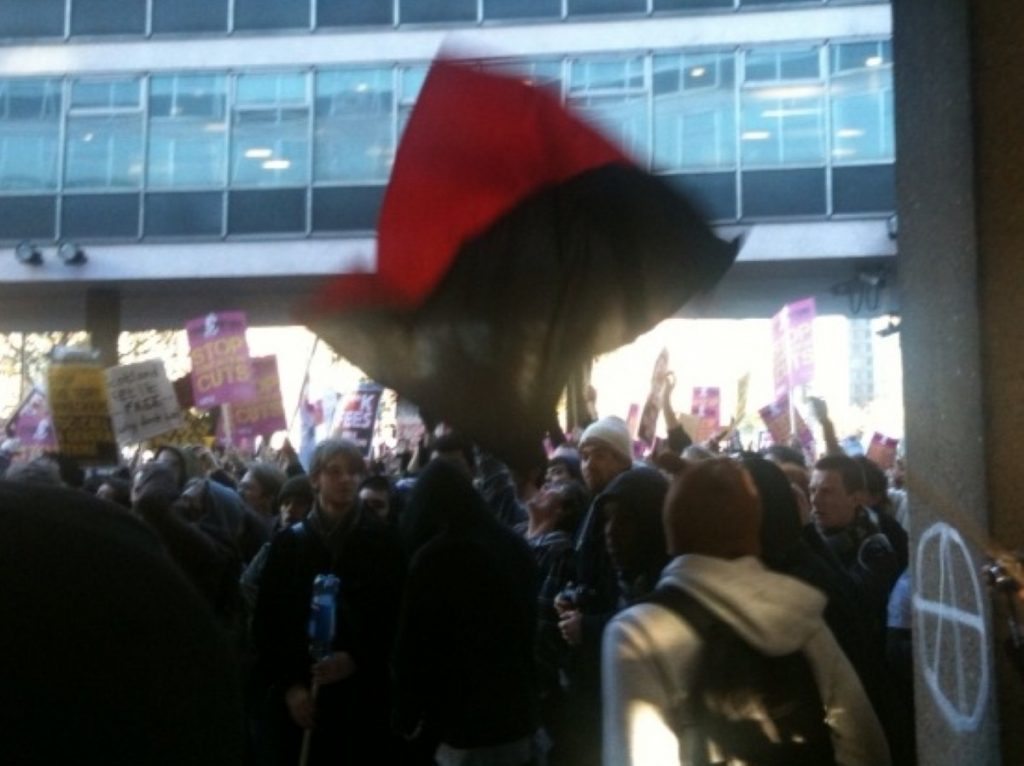Tuition fees: Student protests gather momentum
By Ian Dunt
The protest against tuition fees appeared close to becoming a fully-fledged movement today, as student leaders across the country planned events to bring pressure on the government.
Activists have been galvanised by the level of attendance on Wednesday, despite events being overshadowed by violence at Tory HQ in Millbank.
A nationwide day of action has been tabled for November 24th, as small, localised actions take place all over the country.


Leaders are expecting widespread disruption as sit-ins, protests, occupations and walk-outs take place on campuses all over the country.
Yesterday, Manchester University was the scene of an occupation as students took over a building demanding access to information regarding government spending cuts’ impact on students and staff.
In Cambridge, the university’s science, engineering and technology fair was hit by students protesting the “marketisation of education”.
In the same city, a man suspected of having thrown the fire extinguisher from the roof of the Millbank building on Wednesday has been arrested by police.
“This arrest follows an investigation into public disorder where a fire extinguisher was thrown from the roof of Millbank Tower,” a spokesman said.
Speaking to the Commons yesterday, policing minister Nick Herbert informed MPs that police and National Unions of Students (NUS) had been surprised by the scale of the turnout on Wednesday.
Original estimates for turnout were around the 5,000 mark, but the NUS later upgraded that assessment to 15,000. On the day, about 50,000 people came to demonstrate in central London.
A distinct split was beginning to emerge in the embryonic protest movement, however, as a statement praising the direct action on Wednesday was backed by many local student leaders, despite being diametrically at odds with the views of the national NUS leadership.
“We reject any attempt to characterise the Millbank protest as small, ‘extremist’ or unrepresentative of our movement,” the statement read.
“We celebrate the fact that thousands of students were willing to send a message to the Tories that we will fight to win. Occupations are a long established tradition in the student movement that should be defended.”
The presidents of several local students unions backed the statement, exacerbating concerns among MPs that the riot on Wednesday saw some involvement, or at least acceptance, from the mainstream.
During the Commons debate yesterday, several Tory MPs blamed the NUS leadership for using language which provoked violence and not controlling the protest sufficiently.
More celebrities and activists emerged to back the occupiers today. Author Naomi Klein, musician Billy Bragg and Billy Elliot writer Lee Hall signed an online peition condemning the “witch-hunt”.
Over 2,000 people have joined a Facebook group campaigning against their “victimisation”.
Lecturers in London Metropolitan University and Goldsmiths gave their support as well.
Yesterday, the police officer who narrowly escaped being hit by the fire extinguisher – a member of the controversial Territorial Support Group [TSG] riot police – shared his experience on a BBC Radio 5 Live phone in.
“The fire extinguisher landed right behind me – literally no more than six inches,” he said.
“The height it was thrown from – a solid piece of metal like that – it took chunks out of the concrete paving.
“We were trying to get in there to protect the building, people were spitting upon us, smashing glass bottles full of alcohol, hitting us with sticks and pieces of wood, throwing bricks and masonry at us,” he continued.
“There were tables from within Millbank being thrown against the window to try and smash the window- it was coming at us from two directions. We were kicked, abused, punched. People tried to lift the visors of some of my colleagues and poke them in the face with sticks, and there were threats wishing us death and serious injury.”
Meanwhile, there was evidence yesterday that Labour’s opposition to the Browne review was coalescing around a graduate tax.
One of the main barriers to the tax was Alan Johnson, who was higher education minister when tuition fees were first brought in. After Ed Miliband, an advocate of the idea, became leader Mr Johnson wrote an article for the Independent on Sunday urging his party leader to stick to tuition fees.
“For goodness sake, don’t pursue a graduate tax,” he wrote at the time.
“We should be proud of our brave and correct decision to introduce tuition fees. Students don’t pay them, graduates do, when they’re earning more than £15,000 a year, at very low rates, stopped from their pay just like a graduate tax but with the money going where it belongs: to universities rather than the Treasury.”
But during a speech on the economy yesterday, the now-shadow chancellor struck a more moderate note, saying the idea was being actively looked into.
“This is the central issue now and it’s why the shadow Cabinet has agreed to look at whether a graduate tax can be a fairer and more sustainable alternative to the current mess as part of our policy review proposals,” he said.
The comment, which still leaves plenty of room for Labour to step back from adopting the proposal, nevertheless sees Mr Johnson offer a personal climb down and therefore open up the possibility of Labour adopting the policy – which is supported by the NUS.
The vote on the government proposals is expected to go through the Commons before Christmas.
The 20 Liberal Democrat ministers, including Nick Clegg and Vince Cable, are expected to vote in favour, although backbench Lib Dem MPs may either abstain or rebel.












